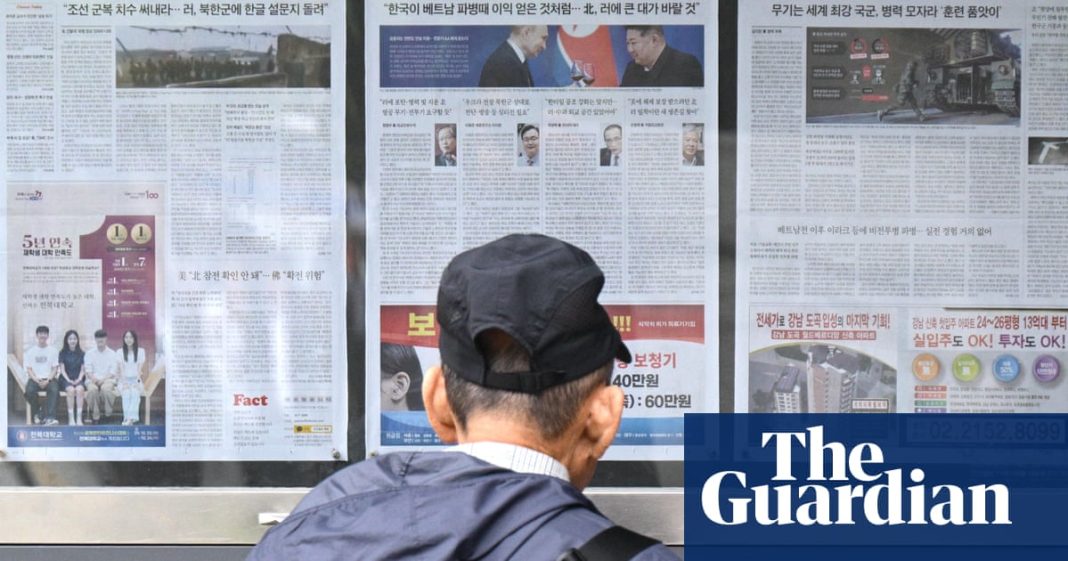North Korea’s Troop Deployment to Ukraine: A New Chapter in Global Conflict
In a startling turn of events, North Korea has reportedly dispatched 3,000 troops to Russia for training, preparing to join Vladimir Putin’s ongoing war against Ukraine. This development, captured in a grainy video posted by NK News, has sent shockwaves through Ukraine, the United States, and Europe, but it carries particular weight for South Korea, just a stone’s throw away from its northern neighbor. What was once a European conflict is now morphing into a significant Asian issue, raising alarms about the implications for regional security.
The Troop Deployment: What We Know
The video shows North Korean soldiers in green fatigues receiving basic supplies at a training base in Russia’s eastern region. This initial deployment is just the beginning, with estimates suggesting that the total number of North Korean troops could rise to as many as 12,000. Among them are specially trained forces known as the "storm corps," indicating that North Korea is not just sending any troops but those with specific combat skills.
For South Korea, which is approximately 7,300 kilometers from Kyiv, this news is particularly alarming. The Korea Times editorialized that North Korea’s involvement in the Ukraine conflict signifies a shift in the dynamics of the war, making it a matter of concern for Seoul. The Korea Herald echoed this sentiment, suggesting that the growing military ties between Russia and North Korea are evolving into a "blood alliance."
Implications for South Korea
The potential for North Korean troops to engage in combat in Ukraine raises serious concerns for South Korea, where tensions with the North are already high. The South Korean government expressed "grave concern" after Russia moved to ratify its defense treaty with North Korea, urging Moscow to halt its "illegal cooperation" with Pyongyang.
Under President Yoon Suk Yeol, South Korea has aligned itself with U.S.-led sanctions against Russia and has provided humanitarian aid to Ukraine. However, as North Korea’s military involvement deepens, there is growing pressure on Yoon to reconsider South Korea’s longstanding policy of not supplying weapons to countries engaged in conflict, including Ukraine. This shift could lead to significant changes in South Korea’s defense posture and its approach to international military aid.
A Proxy War in the Making
Experts are beginning to view the situation as a proxy war, with North Korea directly supporting Russia while South Korea indirectly aids Ukraine. Ramon Pacheco Pardo, a professor at King’s College London, pointed out that both Koreas are gaining valuable military insights from the conflict. If South Korea were to provide lethal weapons to Ukraine, it would further underscore this proxy dynamic.
The stakes are high, and the potential for escalation is real. As North Korean troops prepare for combat, South Korea is weighing its options, including sending officials to Ukraine to share intelligence on North Korean military tactics. This could mark a significant shift in South Korea’s military engagement on the global stage.
North Korea’s Strategic Calculations
For Kim Jong-un, the decision to send troops to Ukraine is not just about supporting Russia; it’s also a strategic move to bolster North Korea’s military capabilities. By participating in the conflict, North Korea can test its soldiers and weaponry in real combat scenarios, gaining invaluable experience. Additionally, the regime stands to benefit financially from its alliance with Russia, potentially securing cash and advanced military technology in return for its support.
Experts warn that this closer relationship with Russia could further embolden North Korea’s nuclear ambitions, posing a heightened threat to South Korea and the broader region. As Harry Kazianis from the Center for the National Interest noted, the longer the war in Ukraine continues, the more reliant Putin may become on North Korean forces, strengthening Kim’s regime and its military capabilities.
Conclusion: A Complex and Evolving Situation
As the situation unfolds, the implications of North Korea’s troop deployment to Ukraine are profound. What began as a European conflict has now drawn in Asian powers, complicating the geopolitical landscape. For South Korea, the stakes are particularly high, as it navigates the challenges posed by its northern neighbor while considering its role in the international community.
As we watch these developments, one thing is clear: the world is witnessing a complex and evolving conflict that could reshape alliances and security dynamics for years to come. The coming weeks and months will be crucial in determining how this situation unfolds and what it means for global peace and stability.



